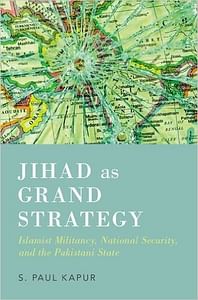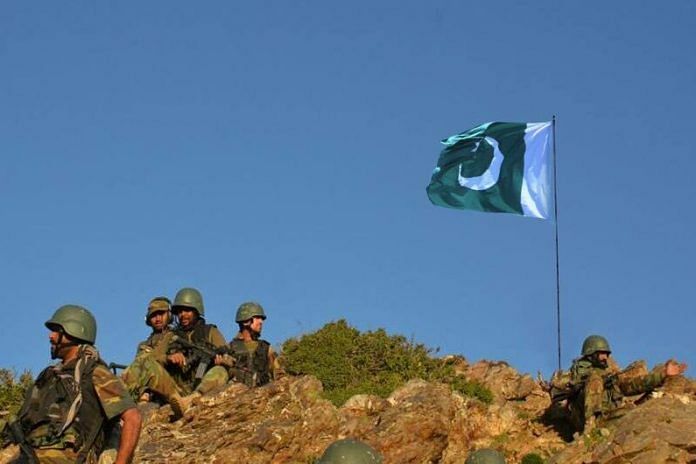In the first of a three-part opinion series on Pakistan, Paul Kapur writes that solving Pakistan’s jihad problem requires more than just reforming its Army—or threats from the U.S. Pakistan needs to change its national narrative. You can read the second part here.
The U.S. Congress is toughening its stance on Pakistan by proposing legislation that could cut economic and military assistance and revoke major non-NATO ally status, if the Pakistanis do not do more to stabilize Afghanistan and fight international terrorism.
If Pakistan cooperates, it could be rewarded with a long-term strategic partnership with the U.S. This would be a step in the right direction. For too long, the United States has provided Pakistan with large-scale economic and military assistance, even as the country supported Islamist militants destabilizing Afghanistan and launching terrorist attacks around the world. At the very least, the U.S. should not underwrite such behavior. But we should be under no illusion that a tougher U.S. stance will actually change longstanding Pakistani policy.
From 1947 to the present day, Pakistan has used religiously-motivated non-state actors as strategic tools. Supporting jihad has been so important to Pakistan that the policy has been a central pillar of the nation’s grand strategy. Pakistan has three main strategic instruments: nuclear weapons, conventional forces, and militant proxies.
 Nuclear weapons and conventional forces have played a defensive role, protecting Pakistan against Indian attacks. Militant forces have served as Pakistan’s primary offensive tool, enabling the country to pursue its most cherished security goal: challenging the territorial status quo in South Asia.
Nuclear weapons and conventional forces have played a defensive role, protecting Pakistan against Indian attacks. Militant forces have served as Pakistan’s primary offensive tool, enabling the country to pursue its most cherished security goal: challenging the territorial status quo in South Asia.
This strategy has promoted internal political cohesion in Pakistan, attrited Indian resources, undermined India’s control of Kashmir, and helped Pakistan shape the strategic environment in Afghanistan.
However, the successes of Pakistan’s strategy have recently given way to serious problems. Militant organisations have escaped Pakistan’s control, caused the diversion of scarce resources from pressing domestic projects, and have forced India to undertake military improvements that deeply threaten Pakistan. These developments threaten to leave Pakistan less secure than it was before.
Pakistan thus suffers from a “jihad paradox.” Pakistan’s weakness made its policy on militants useful. This policy has left Pakistan vulnerable and damaged it, leaving the nation weaker than it was before. Despite its past benefits, the strategy has outlived its utility, and Pakistan will have to abandon it to avoid a catastrophe.
Many analysts blame the Pakistan Army for the strategy on jihad, and argue that reforming the army could allow the country to abandon this policy. The Army does bear a significant portion of the responsibility for Pakistan’s strategy. For example, the Pakistan Army promotes conflict with India to advance its bureaucratic interests, ensuring that it receives a disproportionate share of state resources and dominates domestic and foreign policymaking. The Army promotes continual conflict to advance its ideological commitments, protecting what it sees as Pakistan’s Islamic identity by competing against a Hindu India. This enables the Army to reinforce its role as Pakistan’s ideological protector and undermine India’s dominant position in the subcontinent.
However, these ideological commitments come from a source more fundamental than the Pakistan Army. They come from the founding logic of the Pakistani state. Since Independence, Pakistan’s central narrative has been one of opposition, rooted in the distinction between Islam and Hinduism. As a result, if it is to remain true to its state-building logic, Pakistan cannot cease behaving in an confrontational manner; and it must constantly struggle against India. To abandon this effort would be to relinquish a central element of the identity created to justify Pakistan’s existence. Thus Pakistan resembles a fish that cannot stop swimming. It must continue to move against the current if it is to survive in its current ideological form.
Consequently, solving Pakistan’s jihad problem will require more than just reforming the Army—or threats and promises from the U.S. Congress. A solution can emerge only if Pakistan changes its national narrative, ensuring that opposing India is no longer the country’s central purpose.
This will be extremely difficult, but states have made such thoroughgoing changes in the past. In the late 1980s, Mikhail Gorbachev launched a process of reform that ultimately renounced Communism as the Soviet Union’s organising political principle, and dissolved the USSR. This case demonstrates the magnitude of the challenge, but it also suggests that Pakistan, in principle, could make such a fundamental transformation.
However, the case of the Soviets also indicates that success would require extraordinary leadership—in effect, a Pakistani Gorbachev—with that political vision and commitment to radical reform. Short of such thoroughgoing change, we should expect more of the same from Pakistan, no matter the carrots-and-sticks the U.S. may proffer.
S. Paul Kapur is a professor in the Department of National Security Affairs at the United States Naval Postgraduate School. He is the author of Jihad as Grand Strategy: Islamist Militancy, National Security, and the Pakistani State (Oxford University Press, 2016). The opinions that he expresses in this article are his alone, and do not necessarily represent those of the U.S. government.



